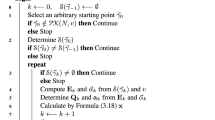Abstract
It is proposed that solution concepts for games should be evaluated in a way that is analogous to the way a logic is evaluated by a model theory for the language. A solution concept defines a set of strategy profiles, as a logic defines a set of theorems. A model theoretic analysis for a game defines a class of models, which are abstract representations of particular plays of the game. Given an appropriate definition of a model, one can show that various solution concepts are characterized by intuitively natural classes of models in the same sense that the set of theorems of a logic is characterized by a class of models of the language. Sketches of characterization results of this kind are given for rationalizability, Nash equilibrium, and for a refinement of rationalizability —strong rationalizability — that has some features of an equilibrium concept. It is shown that strong rationalizability is equivalent to Nash equilibrium in perfect information games. Extensions of the model theoretic framework that represent belief revision and that permit the characterization of other solution concepts are explored informally.
Similar content being viewed by others
References
Aumann, R.J.: 1987, ‘Correlated Equilibria as an Expression of Bayesian Rationality’,Econometrica 55, 1–18.
Ben-Porath, E.: 1992, ‘Rationality, Nash Equilibrium and Backward Induction in Perfect Information Games’, working paper, Department of Economics, Tel-Aviv University.
Bernheim, B.D.: 1984, ‘Rationalizable Strategic Behavior’,Econometrica 52, 1007–28.
Blume, L., A. Brandenburger, and E. Dekel: 1991a, ‘Lexicographic Probabilities and Choice under Uncertainty’,Econometrica 59, 61–79.
Blume, L., A. Brandenburger, and E. Dekel: 1991b, ‘Lexicographic Probabilities and Equilibrium Refinements’,Econometrica 59, 81–98.
Brandenburger, A. and E. Dekel: 1987, ‘Rationalizability and Correlated Equilibria’,Econometrica 55, 1391–1402.
Damme, E. van: 1983,Refinements of the Nash Equilibrium Concept, Springer-Verlag, Berlin.
Gärdenfors, P.: 1988,Knowledge in Flux: Modeling the Dynamics of Epistemic States, The MIT Press, Cambridge, MA.
Harsanyi, J.: 1973, ‘Games with Randomly Distributed Payoffs: A New Rationale for Mixed-Strategy Equilibrium Points,’International Journal of Game Theory 2, 1–23.
Kohlberg, E. and J.-F. Mertens: 1986, ‘On the Strategic Stability of Equilibria’Econometrica 54, 1003–1037.
Kriple, S.: 1963, ‘Semantical Considerations on Modal Logic’,Acta Philosophica Fennica 16, 83–94.
Myerson, R.: 1991,Game Theory: The Analysis of Conflict, Harvard University Press, Cambridge, MA.
Pearce, D.G.: 1984, ‘Rationalizable Strategic Behavior and the Problem of Perfection’,Econometrica 52, 1029–50.
Stalnaker, R.: 1992, ‘Knowledge, Belief and Counterfactual Reasoning in Games’ (forthcoming in proceedings of the second Castigliancello conference, edited by C. Bicchieri and B. Skyrms).
Tan, T. and S. Werlang: 1988, ‘The Bayesian Foundations of Solution Concepts of Games’,Journal of Economic Theory 45, 370–391.
Author information
Authors and Affiliations
Rights and permissions
About this article
Cite this article
Stalnaker, R. On the evaluation of solution concepts. Theor Decis 37, 49–73 (1994). https://doi.org/10.1007/BF01079205
Issue Date:
DOI: https://doi.org/10.1007/BF01079205




